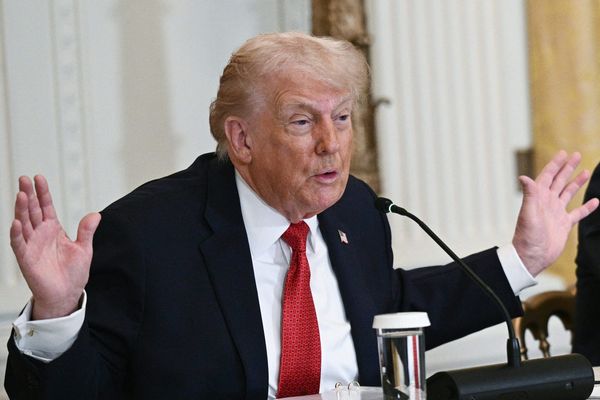
For all the furore over Jacob Rees-Mogg’s “Sorry you were out” notes, used to shame civil servants who were working at home, he only printed and left three on unoccupied desks.
“It was a PR stunt, pure and simple, and that’s Jacob all over,” says one Whitehall source with knowledge of the episode.
The Cabinet Office minister’s move did what it was designed to do: send a signal that Rees-Mogg – and by extension Boris Johnson – was on the anti-woke side of the culture war.
He has played the role of Johnson’s rightwing outrider for three years, saying the things the prime minister could not get away with, such as dismissing Partygate as “fluff”.
And now he is poised to take on the same role for Liz Truss, for whom he hit the media during her campaign by describing her comments suggesting British workers need more graft as “sensible”.
For his loyalty, he has been rewarded with a plum cabinet job as business secretary and Rees-Mogg once again appears to have picked a winner during a Tory leadership campaign.
But for Truss, keeping Rees-Mogg close is a gamble, given his polarising views and propensity to gaffes. He is unashamedly pro-fracking, is in favour of extracting every last drop of oil out of the North Sea and has decried “climate alarmism”. Already, she has had to appoint another minister to sit in cabinet and look after the climate brief after an outcry from pro-green Tories.
The new business secretary, who is strongly pro-deregulation, may also face questions over his continuing financial interests: he retained a substantial stake in the investment firm he co-founded, Somerset Capital Management, while in Johnson’s cabinet.
The new prime minister has shown her faith in Rees-Mogg by promoting him, but political sources say Johnson came close to sacking his ally on more than one occasion, most seriously when he suggested Grenfell fire victims should have had the “common sense” to escape. Rees-Mogg, who had hosted campaign dinners for Johnson at his £5m Westminster townhouse, always found his way back into favour.
“We all thought Jacob was bonkers and none of us thought he was a good spokesman for the government at that point,” says one former Downing Street aide, recalling the middle of the 2019 election campaign.
“He always just managed to say something bone-headed. He was told by No 10 to apologise or face the sack. And he was put in the freezer by Boris for goodness knows how long. But somehow he bounced back.”
His ability to shrug off criticism coupled with his lifelong hunger for the limelight is, they say, Johnson-esque.
“Even more than Boris, he’s always been a proto-celebrity,” says another person who has worked closely with him, pointing to his history of TV appearances as a “young fogey” on Have I Got News for You and an encounter with Ali G.
“He’s a tart. He’s always everywhere, doing anything to get noticed.” A regular figure in the diary columns before he entered political life, Rees-Mogg even appeared in a piece in the Daily Mail in 2007 talking about how his first child was conceived on the fifth day of his honeymoon in Seychelles and was due on his heroine Lady Thatcher’s birthday.
But Rees-Mogg has always seen himself as much more than a caricature.
He is not short of confidence – or ambition. The scope of his ambitions was apparent in an interview he gave to French television as a besuited 12-year-old.
Travelling in the back of a Rolls-Royce, Rees-Mogg declared he “loves money” and wanted to be a company executive by 30. And by 70? “I would love to become prime minister,” he pronounced.
‘We don’t know where he has come from’
Born Jacob William Rees-Mogg in Hammersmith, London, in 1969, he is one of the richest ministers in the cabinet, with Spear’s Wealth Management estimating in 2019 that his net worth is “well over £100m”, including the expected inheritance of his wife, Lady Helena de Chair.
His own background was wealthy but not blue-blooded, though his father, William Rees-Mogg, moved in privileged circles through his job as editor of the Times.
His mother, born Gillian Morris, had been his father’s secretary and now lives close to Gournay Court, a Grade II* listed Somerset mansion belonging to the Rees-Moggs and their six children.
Rees-Mogg famously claims not to change nappies, instead relying on the services of his own former nanny, Veronica Crook, who looked after his own children and has worked for the family for more than five decades.
One contemporary at Westminster Under School, Julien Garran, said the signs of ambition were always there.
“He was pretty pushy even back then. I think he’d been given some shares and I remember one time there was an article about him written up that he’d harangued the CEO for not doing his job properly. At this point he was aged 11,” he said.
Describing him as “unusual”, Garran said: “That was probably the clearest example of his kind of character, and the fact that he was an unusually and surprisingly fast bowler. We were just kids but I think that part of his character probably came out at that point.”
None of his siblings appeared to show a similar love of Victorian traditionalism, although his sister, Annunziata Rees-Mogg, also had political leanings, running unsuccessfully as a Tory candidate and later becoming a Brexit party MEP.
According to the biography of Rees-Mogg by the Conservative peer Lord Ashcroft, his father once remarked to his school teacher: “We don’t know where he has come from.”
After prep school, Rees-Mogg went to Eton, five school years below Boris Johnson and two below David Cameron. From there he went to Trinity College, Oxford, where one of his best friends was former Tory MP Louise Mensch, with whom he remains in touch. Those who know him from the time recall a nerdy but self-publicising young man, who was addicted to Cadbury’s Creme Eggs and Eurosceptic student politics.
Rees-Mogg did not, Mensch says, propose to her, and their relationship was always platonic, contrary to previous rumour, but she did base the “alt-romantic hero” in her novel Venus Envy on him. “He is a sort of almost romance for our heroine and then she basically falls in love with somebody else and so does he,” she says, adding: “We were just very, very, very close.”
Mensch says that one of Rees-Mogg’s best qualities was being “just completely uninterested in pandering to what anybody else thought” and that his love of tradition and the establishment is far from an act.
“The anecdotes that come up about Jacob, that he likes to listen to the shipping forecast and stuff like that, that he would stand up whenever anybody played God Save the Queen, people think those things are affected or done for show in politics, though I can assure your readers that they are not. He has been doing those all his entire life, literally forever,” she says.
It was at Oxford where Rees-Mogg’s Eurosceptic views developed, alongside Daniel Hannan, who would become a Tory MEP. “It was like three little Thatcherites toddling along and just having a great time,” Mensch says.
Andrew Bridgen, a Conservative MP who joined the same 2010 intake as both Rees-Mogg and Mensch, was on the same side as Rees-Mogg during the Eurosceptic battles for a hard Brexit seen in the Theresa May era.
He echoes Mensch’s view that Rees-Mogg is not playing a role. “He’s the real deal. What you see is what you get,” he says. “He doesn’t have a private and public persona.”
Others who have worked with him are not so sure.
“Is it a put-on job or has the mask eaten into the face? It’s not clear,” says the person who worked closely with him for years in politics.
Properties, plagiarism … and potted plants
During his time in business, Rees-Mogg worked in Hong Kong and Mayfair for hedge funds before setting up on his own. His ventures were a success, including Somerset Capital Management, which he established with financier Dominic Johnson and still has an interest in, receiving dividends.
His property portfolio now ranges from Gournay Court to his Westminster townhouse, and his register of interests lists two flats in Pall Mall owned by his company, Saliston. His company also owns a further two properties, a former schoolhouse near Gournay Court and a bungalow in Midsomer Norton.
He does, however, declare a farmhouse in Somerset from which rent is received. Neighbours of a farmhouse property and surrounding fields in Midsomer Norton, in his constituency, believe Rees-Mogg is the beneficiary of a trust that holds the land, although he has declined to answer questions about his ownership.
With so much property wealth, Rees-Mogg has clearly made money in his own right, but he was always intent on entering politics, trying unsuccessfully in Central Fife in 1997 and The Wrekin in 2001.
When he first came to parliament in 2010, Rees-Mogg was viewed as something of a joke figure, best known for his previous campaigning as a 27-year-old hedge fund manager in Scotland with the help of his family nanny and his father’s Mercedes.
His rival Labour candidate, former first minister of Scotland Henry McLeish, says he had to step in to stop the young Tory from being beaten up during that first foray into politics in 1997.
“I was just kind of his protector in a way because he was totally out of his constitutional, and I suppose class, depth because I’m sure he had never encountered people like my supporters in his life,” says McLeish. “I have no idea how such a person could have gained the kind of stature he’s got in terms of a cabinet position in the government.”
Cameron’s modernising Conservative party did not put him on the A-list. But once in parliament, Rees-Mogg was seen by those at the top as almost a harmless idiot, making a number of early missteps, including attending a dinner of the Traditional Britain Group, who he later had to distance himself from when its rightwing supporters later backed “repatriation” of black people to Africa.
There were also a number of long-forgotten scandals in his 2010 election campaign, in which he was caught plagiarising a Trevor Kavanagh column from the Sun and trying to pass off one of his own staff members as a voter on his election leaflet.
He later drew criticism for suggesting that quotas for state-school and non-Oxbridge MP candidates could lead to the election of “potted plants” to parliament and more recently suggested a rise in food bank usage was “rather uplifting” in showing the charitable nature of the British people.
There are also varying accounts about whether Rees-Mogg is as unflappable as he usually appears in public.
His encounters with protesters show he is a rare MP who will happily talk even to those calling him scum, while in interviews the minister seldom appears ruffled by a line of questioning.
But former Labour MP Peter Bradley says he saw another side to Rees-Mogg’s usually composed character when he unsuccessfully stood for parliament in the Wrekin in Shropshire in 2001.
At one hustings, says Bradley, a candidate from “Ukip or whatever kind of Brexit party” caused Rees-Mogg to stop projecting “this calm superiority”, instead going “completely bonkers”.
He added: “He was being outflanked on the right by this anti-EU fantasist and he was really angry that he couldn’t get to the right of this guy.”
He added: “He thought this was his shtick. As I say, it was performance art and this was his crescendo, his climax, and he wasn’t at all pleased about it. He just lost his composure, which of course made the rest of the programme infinitely easier for me.”
This accords with the account of two people who worked with Rees-Mogg in the days of parliament’s Brexit battles, who recall him seriously struggling over the decision not to join the “Spartan” holdouts but to back Theresa May’s deal on the third attempt.
They said they detected a sense of disappointment in himself that he was not as purely Eurosceptic as his self-image, but that he had been subject to pressures from friends, particularly those in business, begging him not to usher in a general election and the possibility of a Corbyn-led government.
He did not throw his hat into the ring this time, but could Rees-Mogg ever stand to be leader himself?
Colleagues say his devout Catholic views, as well as his rightwing ones, would be a problem – including being anti-abortion even in cases of rape or incest, his description of morning-after pills as “abortifacients” and his observation that he “took the whip” from Rome in relation to his vote against gay marriage.
But then many thought this and his extensive business interests would have been a barrier to him becoming a minister.
Asked in the past whether he would like one day to be Conservative leader, Rees-Mogg has said he “wouldn’t put any money on it”. However, he was said by those close to him to have been mulling the idea of a run. And, after all, Boris Johnson once claimed he was more likely to be reincarnated as an olive than to become prime minister of the United Kingdom.
• This article was amended on 9 September 2022 because an earlier version described Somerset Capital Management as a hedge fund. To clarify: it is an investment firm.







